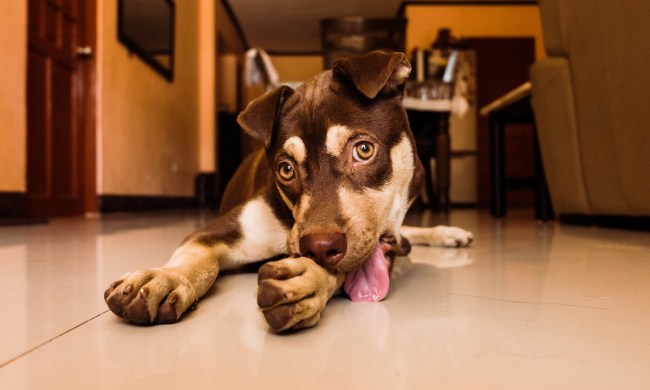There are plenty of reasons that Himalayan dog chews would be a desirable dog treat for pet owners and their dogs. Most chews are all natural, so you do not have to worry about any preservatives or artificial flavors filling the treats. If you have a dog that is naturally antsy and loves to chew on things, they will love the long-lasting nature of the chew. Chewing on a Himalayan dog chew will promote oral hygiene.
Himalayan dog chews are a dog treat made with simple ingredients. They are first made by boiling cow and yak milk together. Sometimes it can have other ingredients added like Himalayan salt or lemon juice. This creates a fully emulsified milk mix that will dry over the span of multiple weeks. Once it dries, it becomes a hardened chew that your dog can gnaw on for hours on end.
SmartBones SmartSticks
Best Overall

The SmartBones SmartSticks are not just a fantastic himalayan dog chew, but they are also a great alternative for your dog if they like munching on rawhides. Rawhide treats can cause gastrointestinal issues and can have a lot of chemicals that could cause indigestion. These dog sticks are made of highly digestible and delicious ingredients so that your dog can enjoy munching on these bones with no health problem.
EcoKind Pet Treats Yak Dog Chews
Best Flavor

These delicious EcoKind Pet Treats Yak Dog Chews deliver a flavorful chew that will keep your dog busy. These himalayan dog chews are made purely from yak and cow’s milk. The milk has been treated to get rid of the lactose so that even lactose-intolerant dogs can enjoy these tasty treats. This is a highly nutritious and delicious chew that is about 6 to 8 inches long.
Native Pet Yak Chews
Best Freshness

If you are looking for the freshest chews that your dog will go crazy for, the Native Pet Yak Chews will be perfect. The himalayan dog chews only have four simple and fresh ingredients: yak milk, cow milk, lime juice, and salt. These chews are low odor in comparison with other kinds of chews, so you can have them around the house and not even notice that they are there. As long as you store these properly, then you will have them fresh for your dog every time.
These natural Himalayan dog chews will entertain your dog, promote their dental health, and give them a tasty way to take out their energy and anxieties. No need to worry about constant replacement when they are gnawing on these for hours on end.



